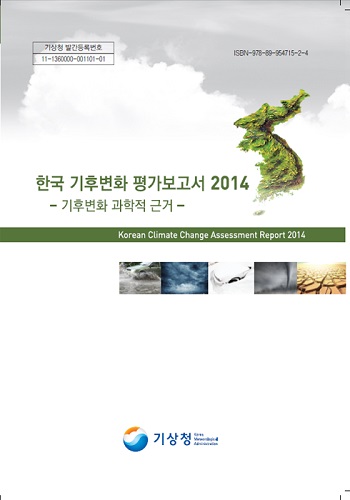While many regions across the globe see signs of global warming -- including the melting of glaciers and abnormal weather -- a new assessment has predicted that climate change on the Korean Peninsula is progressing rapidly, at possibly three times faster than climate change in other regions on Earth.
 According to the new report, co-published by the Ministry of Environment and the Korea Meteorological Administration, the average temperature on the Korean Peninsula has increased 0.5 degrees Celsius every decade, a larger gap than that found in any other region. The causes have mostly been attributed to the increased level of carbon dioxide produced by fossil fuels and new patterns of land use. The report revealed that the average temperature in Korea is on the steady rise, rising about 0.23 degrees Celsius every ten years between 1954 and 1999, by about 0.41 degrees Celsius per decade between 1981 and 2010 and, finally, by 0.5 degrees Celsius between 2001 and 2010.
According to the new report, co-published by the Ministry of Environment and the Korea Meteorological Administration, the average temperature on the Korean Peninsula has increased 0.5 degrees Celsius every decade, a larger gap than that found in any other region. The causes have mostly been attributed to the increased level of carbon dioxide produced by fossil fuels and new patterns of land use. The report revealed that the average temperature in Korea is on the steady rise, rising about 0.23 degrees Celsius every ten years between 1954 and 1999, by about 0.41 degrees Celsius per decade between 1981 and 2010 and, finally, by 0.5 degrees Celsius between 2001 and 2010.
Water temperatures and the sea level have also been on the rise, by about two to three times faster than the average speed of change found elsewhere. Water temperature in Korea has increased by 0.85 degrees Celsius and the sea level has risen by 1.4 millimeters. The report explained that these types of climate change can be associated with a number of negative outcomes, bringing change to ecological distribution and to many species of wild life, reducing the total amount of food available and increasing both the number of patients infected with diseases and the death toll that follows.
The report predicted that the death toll from blistering heat waves would be twice the current figure within two decades. The number of people sacrificed to the summer heat between 2001 and 2010 remained at 0.7 people per 100,000, but the figure is expected to rise to 1.5 per 100,000 between 2036 and 2040.
This new report was completed by 155 professionals and specialists in the environment and climate change. They carried out investigations and analysis based on around 2,500 academic dissertations and reports released both in Korea and around the world. They then came up with their own new results concerning scientific basis, environmental effects and human's ability to adapt.
By Lee Seung-ah
Korea.net Staff Writer
slee27@korea.kr

According to the Korean Climate Change Assessment Report 2014, climate change and the sea level on the Korean Peninsula have been changing about three times faster than the average speed of climate change in other parts of the world.
Water temperatures and the sea level have also been on the rise, by about two to three times faster than the average speed of change found elsewhere. Water temperature in Korea has increased by 0.85 degrees Celsius and the sea level has risen by 1.4 millimeters. The report explained that these types of climate change can be associated with a number of negative outcomes, bringing change to ecological distribution and to many species of wild life, reducing the total amount of food available and increasing both the number of patients infected with diseases and the death toll that follows.
The report predicted that the death toll from blistering heat waves would be twice the current figure within two decades. The number of people sacrificed to the summer heat between 2001 and 2010 remained at 0.7 people per 100,000, but the figure is expected to rise to 1.5 per 100,000 between 2036 and 2040.
This new report was completed by 155 professionals and specialists in the environment and climate change. They carried out investigations and analysis based on around 2,500 academic dissertations and reports released both in Korea and around the world. They then came up with their own new results concerning scientific basis, environmental effects and human's ability to adapt.
By Lee Seung-ah
Korea.net Staff Writer
slee27@korea.kr